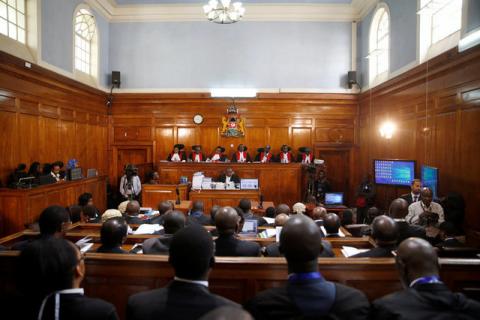Advertisement
Kenyan court asks for scrutiny of electronic vote-count systems
NAIROBI (Reuters) - Kenya's Supreme Court ordered the election commission on Monday to allow the opposition, which is disputing the results of this month's presidential vote, to have access to its computer servers and electronic devices used in the vote-count.
Election authorities say Kenyatta won a second term in the Aug. 8 polls by 1.4 million votes. A parallel tally by independent monitors based on a sample of around 2,000 polling stations produced a similar result.
There were scattered protests in strongholds of opposition leader Raila Odinga. At least 28 people were killed in election-related violence, many of them shot by police, after results were announced.
The protests, which dissipated within days had raised fears that political violence could again destabilize the region's biggest economy, as it did following a disputed election in 2007.
Odinga's opposition coalition said in its court petition that results from more than one third of polling stations are "fatally flawed".
James Orengo, the coalition's lead lawyer, said it rejected some tally sheets because they lacked security features and an official stamp.
"These forms and the security features were supposed to protect the integrity of the process," he said.
The paper forms from each of the 40,883 polling stations were supposed to be signed by agents for each political party observing the process.
The system was designed as a manual backup to verify electronic results. In the 2013 election, electronic systems failed widely.
The court said it would allow Odinga's National Super Alliance (NASA) and Kenyatta's Jubilee Party limited access to the Independent Electoral and Boundaries Commission's electronic devices to verify details like who had used the devices and accessed the servers.
It also said the commission must provide the paper documents used to collate the results.
A lawyer for the commission said it would comply.
Odinga also ran in 2007 and 2013, losing both times and blaming fraud. He went to court to challenge the 2013 election result -- a decision that helped quell a repeat of violence then.
The election commission has been criticized by Kenyan civil society groups for being slow to post copies of the paper forms online. More than a week after official results were announced, thousands of scans of the forms verifying the result were still missing from its website.
The court must rule by Sept.1. If it rules in favor of the opposition, a new presidential election must be held within 60 days.
(additional reporting by Humphrey Malalo; editing by Maggie Fick and Richard Balmforth)



















Add new comment